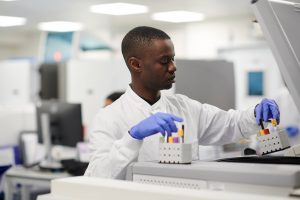While
the world is celebrating developments of various vaccines, a new research has something
in store that can lead to the development of new vaccines against the virus.
In a
new study, scientists have concluded that the immune response developed by the antibodies present in the mucous membrane against the novel coronavirus are
activated much earlier than other types.
Scientists
have taken 150 COVID-19 patients into observation.
Also Read: ‘Feel privileged’, says 90-year-old Briton after receiving world’s first COVID vaccine
According
to the scientists, including those from Sorbonne University in Paris, the IgA
antibodies found in the mucosa dominate the early response to the SARS-CoV-2
virus compared to other antibodies such as the IgM and IgG.
They
said the findings, published in the journal Science Translational Medicine, are
“somewhat unexpected” since IgM antibodies are usually the immune
system’s first responders.
In
the study, the researchers, including Delphine Sterlin from Sorbonne
University, measured antibody responses in the blood, saliva, and fluid from
the broncho-alveolar lung wash in 159 COVID-19 patients, whose disease symptoms
ranged in severity.
“Early
SARS-CoV-2-specific humoral responses were dominated by IgA antibodies,”
the researchers wrote in the study.
They
found that the concentrations of the IgA antibodies were higher than those of
IgG and IgM in these fluids for the first three to four weeks after the first
appearance of symptoms, and then waned.
However,
the scientists said the IgA persisted in saliva for several more weeks.
They
believe the results may inform the development of vaccines that encourage the
IgA response, as well as IgA-based tests to detect infection at early stages.
According
to the researchers, the surge in IgA is associated with an increase in
IgA-secreting cells called plasmablasts, which can preferentially target the
mucosal surfaces in the respiratory tract that the virus attacks.
Also Read: US Congress aims to pass stopgap bill as COVID-19 relief talks continue
They
also found that IgA was more potent than IgG at neutralising SARS-CoV-2. Citing
an earlier research, Sterlin and her team said the IgA responses to the novel
coronavirus in the form of dimeric IgA — consisting of two IgA molecules
linked together — was roughly fifteen times better at neutralising the
SARS-CoV-2 virus than the monomeric form.
According
to this previous study by Zijun Wang from The Rockefeller University in the US,
the dimeric IgA is typically considered the most prevalent antibody type in
mucosal tissues of the upper respiratory tract — a major point of entry for
the virus.
“This
observation is consistent the finding that the dimeric form of IgA, which is
found in the mucosa, is more potent against authentic SARS-CoV-2 than both IgA
and IgG monomers,” Sterlin and her colleagues noted in the current study.





